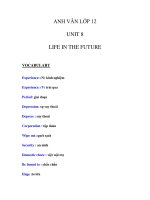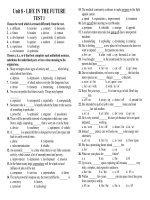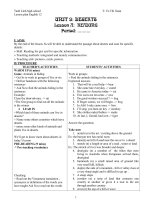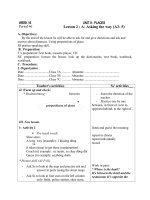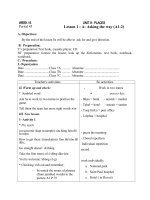giáo án tiếng anh lớp 12 unit 8 life in the future
Bạn đang xem bản rút gọn của tài liệu. Xem và tải ngay bản đầy đủ của tài liệu tại đây (154.18 KB, 13 trang )
Date of preparation: 1/12/2013
Period 44: UNIT 8: LIFE IN THE FUTURE
Lesson: Reading
I. Objectives: - By the end of the lesson the students will be able to have a
general picture about how future life would be through the telescope of an
optimist and a pessimist.
- be acknowledged with new words relating to life in the future
such as economic depression, micro technology,
- develop scanning skill through useful exercises: finding words
with given meaning, answering questions and note taking.
II. Methods: communicative approach
III. Teaching aids : textbooks, guidebook, pictures
IV.Procedure
1. Class organization:
Class Date of teaching Attendances
2. Check-up: During new lesson
3. New lesson:
Stage Teacher’s activities Students’ activities
Warm up
(5mins)
Before
reading
(10mins)
While
reading
(20mins)
- Ask Ss to look at the picture
and answer some question?
1/ What are the people going
to do?
2/ Does it look like a normal
airplane?
3/ How is it different?
4/ Do you think that life in the
future will be like this?.
- Introduce the lesson
Teach some new words:
- pessimistic (adj.) ≠
optimistic: bi quan ≠ lạc quan
(antonym)
- terrorist (n.): someone who
frightens, hurts, or kills others
: khủng bố (explanation)
- depression (n.): sự khủng
hoảng (translation)
- burden (n.): a heavy load:
gánh nặng (explanation)
1. Task 1 :find words or
phrases
- Ask students to work
individually in 3 minutes to do
this task.
- Guide students to read
through the passage , then
focus on only the sentences
surrounding the suggested
words to do the task
effectively.
- Give students some more
words that may be new/
unfamiliar to them.
- Guide the ss to read the word
in chorus and individually.
2.Task 2: Answer the
questions
- Ask students to read the
passage again then work in
pairs to ask and answer the
suggested questions.
- Walk round the class to give
help if necessary.
- Give suggested words,
phrases or useful suggestions.
- Correct the students’ work.
Task 3: Complete the notes
- Listen to teacher.
- Look at the picture and
answer the questions:
1/ They are going to fly.
2/ No
3/ It looks more modern than
a normal airplane. It has no
wings.
4/ Yes/No
- Learn new words
- Read new words
- Make examples with these
words
- Work individually to read the
text then choose the the words
and phrases in the passage:
- Share the key with other
students:
Keys
1. Pessimists: nhung nguoi
bi quan
2. Optimists: nhung nguoi
lac quan
3. Economic depression: suy
thoai kinh te
4. Terrorism: khung bo
5. Wiped out: xoa sach
6. Space shuttle: tau vu tru
- Listen to the teacher then do
the task.
- Works in pais:
Keys:
1. Many large corporations
will be wiped out and
millions of jobs will be
lost.
2. The security of the earth
will be threatened by
terrorism, as terrorist
groups will become more
4. Consolidation: - Retell the main ideas of the lesson.
5. Homework: - Ask Ss to write a paragraph about the disadvantages of
robots
- Ask Ss to prepare next period: Unit 8: Speaking
Date of preparation: 01/12/2013
Period 45: UNIT 8: LIFE IN THE FUTURE
Lesson: Speaking
I. Objectives: - By the end of the lesson the students will be able to know how
to interrupt politely when other people are speaking, and how to return to the
topic after being interrupted.
- Enhance presentation skills through explaining or clarifying
unclear information when being asked, and dealing with other situations.
II. Methods: communicative approach
III. Teaching aids : textbooks, guidebook
IV.Procedure
1. Class organization:
Class Date of teaching Attendances
2. Check-up: During new lesson
3. New lesson:
Stage Teacher’s activities Students’ activities
Warm up
(5mins)
Before
speaking
(10mins)
While
speaking
(20mins)
After
speaking
(7mins)
- Tell a short story to prove
that the renovation measures
have apparently changed the
social and people’s lives
positively.
1. Task 1
- Guide students how to
practise.
- Ask students to work
individual.
- Walk around and help them.
- Call students to say.
- Correct their mistakes.
2. Task 2
- Guide students how to
practise.
- Ask students to work in
pairs.
- Help the students with new
structures.
It is likely that+ clause
It is unlikely that+ clause
It is possible that+ clause
It is impossible that+ clause
- Walk around and help them.
- Call some student to stand
up and report before the class.
- Correct their mistakes.
3.Task 3( for good students)
- Guide students how to
-Listen and give one’s own
ideas or story if being asked.
- Pair work.
- Practice answering the
toppic:
S1. By the end of the 21st
century . Chinese astronauts
will have landed on Mars.
S2. By the end of the 21st
centery, the third city on the
moon will have been declared
open. This new city will have
had a population of more than
200,000 people.
We use “will+have + P2.”
- Listen to the teacher then
practise.
- Work in pairs.
Ex:
A. Do you think that by the
end of the 21st cetery, there
will have been some cities on
the moon ?
B. I'm afraid not, Although
there surely will have
significant developments in
science and technology, the
moon is too far from us, and
the environment and other
conditions there seem to be
totally different.
C. I think it's very likely that
by the end of the 21st century
thanks to the development of
science and technology.
D. In my opinion, It's unlikely
that by the end of the 21st
century people will be living
to the age of 150 because there
will be more and more
diseases
E. To my knowledge,
nowadays we already have
cars running on hydrogen. and
I think there's no doubt that we
will have cars running on sea
water by the year 2050.
4. Consolidation: - Retell the main ideas of the lesson.
5. Homework: - Ask Ss to write a paragraph about what life will be one
hundred year from now
- Ask Ss to prepare next period: Unit 8: Listening
Date of preparation:
Period 46: UNIT 8: LIFE IN THE FUTURE
Lesson: Listening
I. Objectives:
By the end of the lesson the students will be able to have background
information about the life expectancy of people in the near future and how to
have a long healthy life.
III. Teaching aids : textbooks, guidebook, cassettee player
IV.Procedure
1. Class organization:
Class Date of teaching Attendances
2. Check-up: During new lesson
3. New lesson:
Stage Teacher’s activities Students’ activities
Warm up
(5mins)
Before
listening
(10mins)
While
listening
(20mins)
- Ask Ss to make a list of
words related to “how to have
a long and healthy life” .
Today we will listen to the
interview about people’s life
expectancy in the future.
Discuss the question: Which
of the following factors do
you think might help people
have a long and healthy life?
+ No smoking? Why?
+ Love a lot? Why?
- Ask one pair to report what
they have discussed.
- Introduce some new words
(eliciting , give the definitions
in English then ask students to
translate them into
Vietnamese to check their
understanding)
- Let the whole class read the
new words twice or three
times.
- Call 2-3 students to read new
words again.
1. Task 1: True/ False
- Ask students to read the
statements before listening
and then listen to decide
whether the statements are
true or false.
- Play the tape or read the
passage twice
- Ask some students to give
their answers. Ask them to
give reason for their answers.
If their answers are right,
repeat them; if not give the
correct answers.
2. TASK 2: Answering the
questions
- Ask them to listen again the
second and the third time to
finish Task 2:
- Listen to the teacher and do
the task :
eating healthy food
going to bed early
doing exercise
laughing a lot
eating a lot of meat
-Listen to the instruction
- People should:
+ eat healthy food like
vegetables, low-fat daily
products,mushrooms
+ drink a lot of water, do
exercise , laugh a lot . play
some sports
- People should get away
from:
+ drinking too much beer,
wine and coffe
+ smoking and eating a lot of
meat , butter, high-fat foods.
+ working too hard and relax
too little,
+ living in contaminated
environment.
- Do Task 1 in pairs
- Read the statements in Task
1.
- Listen to the passage and
answer the questions
A. F(Some scientists can
predict)
1. F(Because we look after
ourselves, eat more
healthily, cut down on
things like butter,
alcohol and cigarettes)
2. F(80) 3. T
4.T
- Listen again the third time to
finish the Task.
- Discuss the answers to the
questions in pairs.
4. Consolidation: - Retell the main ideas of the lesson.
5. Homework: Write a paragraph about the disadvantages of having a very long
life.
Date of preparation /12/2013
Period 48: UNIT 8: LIFE IN THE FUTURE
Lesson: Writing
I. Objectives:
- By the end of the lesson the students will be able to write a complete
paragraph about the world in which they would like to live in the year
2020
III. Teaching aids : textbooks, guidebook
IV.Procedure
1. Class organization:
Class Date of teaching Attendances
2. Check-up: During new lesson
3. New lesson:
Stage Teacher’s activities Students’ activities
Before
writing
(15mins)
While
writing
(20mins)
1. Task 1
- Ask Ss to read essay and
answer the questions about it.
1. What are the student's
concerns about:
- wourld peace?
- employment?
-the environment ?
- the people?
2. Are your concerns similar
to those?
3.Do you have other concerns/
what are they?
- Further explain difficult
words and structures
+ under the threat of terrorism
+ live in harmony: song trong
su hai hoa
+ my main desire: mong uoc ,
khat vong
+ materialistic: CN VC. nang
ne VC
- Call on some Ss to write the
answer for Q1 on the board.
- Check the answers in front
of the class as a whole.
- Collect the ideas and write
on the BB for later.
2. Task 2
- Ask Ss to work individually
to write a complete 100-word
paragraph on the given theme:
The world in which you
would like to live in the year
2020.
- Give suggested writing.
- outline:
+ Topic idea: to build up a
green worl
+ The air: Fresh, clean and
without noise
+ Streets: large and clean, lots
of trees
+ Sources of water:
uncontaminated and enough
water for everyone
+ The eco-system: balancing
- Conclusion: That ideal world
needs the co-operations of
every Earth citizen.
- Call on two Ss to write on
- Whole class
- Read the essay written by
student and answer the
questions.
Q1. World peace: peaceful
world, no war, no conflicts, no
threat of terrorism, people live
in harmony.
- employment: everyone has a
job
- environment: clean and
healthy, less noise, less
poplution, larger parks.
wildlife is protected
-people: less materialistic, less
selfish, less violent and more
loving.
_ Contribute the ideas for
question 3
- Listen to carefully then
complete paragraph.
- crosscheck friend's work,
exchange ideas and comment.
Writing.
I would like to live in a green
world where everyone can
enjoy a healthy and peaceful
environment. In that world ,
the air is always fresh, clean
and without noise. I can ride
my bicycle on clean, large
streets with lots of green trees.
Sources of water like lakes,
rivers and seas are
uncontaminated and surely.
there is fresh enough water for
every one. Moreover, the eco-
system is always balancing
and the humankind live
peacefully among other
species of animals and plants.
To build such a world is a
difficul task and needs strong
world-wide co-operations,but
4. Consolidation: - Retell the main ideas of the lesson.
5. Homework: Write a paragraph about the disadvantages of having a very long
life.
Date of preparation /12/2013
Period 49: UNIT 8: LIFE IN THE FUTURE
Lesson: Language focus
I. Objectives:
- By the end of the lesson the students will be able to pronounce the
contracted forms of auxiliaries correctly and master the use of some
common prepositions.
II. Methods: communicative approach
III. Teaching aids: textbooks, lesson planning, cassette tape
IV.Procedure
1. Class organization:
Class Date of teaching Attendances
2. Check-up: (5mins) Check Ss’ homewords
3. New lesson:
Stage Teacher’s activities Students’ activities
Pronunciation
(5 mins)
Grammar.
(7mins)
- Pronounce the auxiliaries
both contracted forms and full
forms for students to
recognize the difference
- Pronounce the second time
for the students to repeat.
- Ask 2-3 students to repeat,
correct their mispronounce
- Read 2 times the sentences,
and then let the whole class
read the sentences twice or
three times.
- Call 2-3 students to read the
sentences again.
A. Prepositions.
a. Prepositions after verbs.
- To be in time; kip gio
- To be on time: dung gio
- To die of: chet vi benh
gi,dieu gi
b. Prepositions of time.
- AT: with clocl time : at 4
oclock
+ at night, at Christmas, at
lunch time
- On: with days of week: On
monday
+ On Monday morning
+ On that day./ On your
birthday
- In with months, years ( in
May, in 2010
+ In the evening/ in the
afternoon / in the 19th
century/ in the holiday
B. Articles.
+ Definite aeticle: The ( the
car , the book , the apple , the
ink-pot the engineer )
- The definite article is used:
* before a definite noun
- I have a book and a pen. The
book is thick
* Truoc menh de quan he
- The book which I bought last
week is expensive
* cau menh lenh
- Open the door !
* Noi nguoi hay vat duy nhat
tren doi.
The moon is smaller than the
- Listen to the teacher
- Read after the teacher
+ I have I've
+ I have not I haven't
+ he has he's
- Read the sentences twice or
three times
- Read the sentences again.
- Listen to the teacher
carefully then write down their
notebooks
- To believe in: tin vao mot
dieu gi do , ai do.
- To warn sb about st: canh
bao ai do
- To be famous for st: noi
tieng ve cai gi
- To get married to sb; ket hon
voi ai
c. Prepositions of place.
-In: trong / On : o tren/ AT:
noi cu the
+ There is a book in the bag.
+ Don't leave your books on
the floor.
+ Nam is not at school. He is
at home
+ we met him at the airport
Do exercise 1: Choose the
appropriate prepositions
- Give the answers
1. in time for the
meeting
2. of various types of
cancer
3. on business in Mexico
4. At the end
5. tome
6. in you
7. about the difficulties
8. forher beautiful face
9.between the chemist's ,
opposite
10. to John and
Exercise 2: Put a / an, the or
4. Consolidation: - Retell the main ideas of the lesson.
5. Homework: - Redo all exercises into notebooks.
- Prepare new lesson: Unit 6: Future jobs
